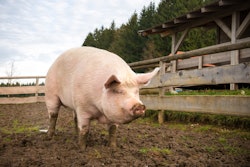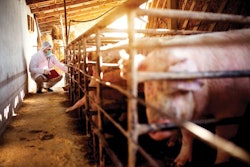
Over the past 10 days, further African swine fever (ASF) outbreaks in domestic pigs have been reported by four European states, all in backyard herds.
Among domestic pigs and wild boar across Europe, ASF continues to spread. This development over the past year is the main driver behind the latest update to the ASF action plan in France.
As the agriculture ministry confirms, France remains free of the disease. However, there would be serious health and socio-economic consequences if the ASF virus were to enter the country, impacting wildlife conservation, hunting, nature lovers and tourists — as well as the national pig industry.
Building on an action plan developed in 2018 and updated this year, the latest revisions were announced by agriculture minister Marc Fesneau last week.
The 20-point plan focuses on five main areas. Firstly, to prevent the entry of the ASF virus into France, there is more cross-border cooperation with Italy and a campaign with travelers raising awareness of the disease risks. Furthermore, in order to detect any disease as early as possible, wild boar populations are to be controlled, and health monitoring will be stepped up.
For those involved in the pig industry, the plan will involve improving farm biosecurity practices, and consultation over a crisis management system in case ASF enters France.
Last but not least, preparations will be made to anticipate the economic consequences on various markets — domestic, in Europe, and other countries — if the disease were to spread.
“Animal diseases are constantly evolving and require us to constantly adapt,” said Fesneau. “This is the whole meaning of this new action plan, developed in consultation with professional sectors and hunting stakeholders. Preventing African swine fever is everyone’s business. We are all concerned and resolutely involved.”
He added that funding of up to EUR2.3 million (US$2.6 million) will be made available in France to improve biosecurity for livestock farmers and to boost wildlife surveillance.
4 European nations register new cases in pigs
Total number of ASF outbreaks in commercial and backyard pigs across Europe this year has reached 4,494.
This is according to the Animal Disease Information System from the European Commission (EC; as of December 16). It monitors notifiable animal diseases in member states of the European Union (EU) and most of the adjacent countries.
Sixteen nations have registered one or more outbreaks in this population in 2023.
For comparison, a total of 537 outbreaks in 12 European states were recorded through the system during the whole of 2022. Approximately three in five of all the herds affected that year were in Romania.
Reporting the highest number of outbreaks in domestic pigs with the EC so far this year is Bosnia-Herzegovina, where the total had reached 1,508 by December 16. This represents an increase of 22 since the previous edition dated December 8.
Next came Croatia (now with a total for the year to date of 1,124), Serbia (977) and Romania (737). The next highest national total is Ukraine, with 35 confirmed outbreaks for the year to date.
Evidence of further outbreaks in domestic pigs is also given in official notifications to the World Organisation for Animal Health (WOAH).
Over the past 10 days, Romania has confirmed two further ASF outbreaks, while Croatia and Ukraine have each added one to their respective totals. All of these affected units were described as “backyards.”
ASF outbreaks in European wild boar pass 7,500
So far this year, 20 countries have officially registered with the EC one or more outbreaks of the disease in their wild boar populations (as of December 16). Total ASF outbreaks in this population recorded through this system has reached 7,628.
For comparison, 15 European countries covered by the EC System registered a total of 7,442 outbreaks of ASF in this population during the whole of 2022.
The latest figure is 164 more than in the previous EC report dated December 8. Eleven states have confirmed further outbreaks through the system, including Poland (with an increase of 42), Bulgaria (27), Lithuania (24), Latvia (23) and Italy (22). Registering smaller numbers of new outbreaks — eight or fewer — were Bosnia-Herzegovina, Estonia, Germany, Romania, Slovakia and Ukraine.
In 2023, Poland has reported the highest number of outbreaks to the EC in this category (2,659), followed by Italy (964), Germany (891) and Latvia (713).
Over the past 10 days, the veterinary agencies of the Czech Republic, Hungary, North Macedonia and Russia have officially notified WOAH about new cases in their respective wild populations.
View our continuing coverage of the global African swine fever situation.
















